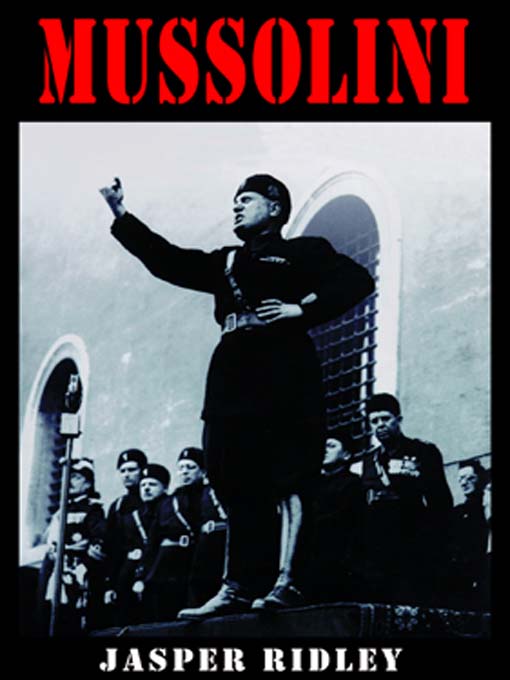Historian Jasper Ridley brings us this comprehensive biography of the man who invented fascism: Benito Mussolini, widely regarded as one of the arch villains of the twentieth century. A complex and contradictory figure, Mussolini won the fascination of many statesmen and writers—and their wives. From his early years raised in the traditions of revolutionary Italian Socialism to his violent execution by Communist partisans at the end of World War II, we watch Mussolini's power ambitions erode his political ideals as he evolves from brilliant orator and journalist to empire-building dictator enforcing his authority by death squads. A man initially admired by such Western luminaries as Winston Churchill, or underestimated as a posturing buffoon, he eventually showed his true colors as a racist and persecutor of the Jews. He sought equal stature with Hitler, but his alliance with him would prove disastrous.
-
Creators
-
Publisher
-
Release date
July 18, 2006 -
Formats
-
OverDrive Listen audiobook
- ISBN: 9781483064420
- File size: 447914 KB
- Duration: 15:33:09
-
-
Languages
- English
-
Levels
- Text Difficulty: 9-12
-
Reviews
-
AudioFile Magazine
Here is a biography of Italy's Fascist dictator, Hitler's ally, and one of the great stock villains of the twentieth century. In crisp British tones, Nadia May delivers an exceptionally lucid oral interpretation of Ridley's snaky prose. Her exemplary reading is marred, though but no means spoiled, by inexplicable pauses and mouth noises. Y.R. (c) AudioFile 2000, Portland, Maine -
Publisher's Weekly
September 28, 1998
Hitler once allegedly told Mussolini that he was "too kind to be any good as a dictator." The remark, suggests prolific biographer Ridley (Thomas Cranmer; Lord Palmerston; Garibaldi; Tito), was "banter between friends in which an apparent censure conceals a compliment." Yet the line also anticipates Ridley's own approach to the brazen, boastful demagogue who ruled Italy ruthlessly for 21 years with the help of thugs and thieves who did Il Duce's bidding. Although Mussolini's revived Roman empire is generally seen as a house of cards, the corrupt creation of a shrewd phrase-maker, Ridley is nonetheless cautiously admiring. His Duce is a good family man (despite his mistresses), a patriot (beneath the propaganda), an adroit politician (except in foreign affairs), even a humanitarian (who didn't deport arrested Jews to death camps). He portrays Mussolini as a pragmatist in peacetime, a bumbler in war. In his account of the years from 1923 to 1940, Ridley writes that Fascism "did not greatly interfere" with ordinary lives and "brought some real benefits to the people," but any such benefits were undermined by an opportunist choice of wartime allies. Perhaps losing interest, or failing in sympathy with the wartime Duce, Ridley passes over the embarrassing and disastrous Axis years in relatively few pages, closing with Mussolini's summary execution by partisans in the last days of the war. Somewhat casual with facts and lacking the sharp candor of Denis Mack Smith's still-standard life (1982), Ridley's Mussolini is not a page-turner. Sixteen-page photo insert.
-
Formats
- OverDrive Listen audiobook
subjects
Languages
- English
Levels
- Text Difficulty:9-12
Loading
Why is availability limited?
×Availability can change throughout the month based on the library's budget. You can still place a hold on the title, and your hold will be automatically filled as soon as the title is available again.
The Kindle Book format for this title is not supported on:
×Read-along ebook
×The OverDrive Read format of this ebook has professional narration that plays while you read in your browser. Learn more here.


